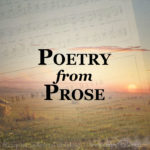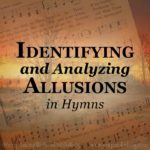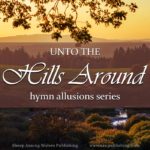Hallelujah, Praise Jehovah
This series on Scripture Allusions in Hymns takes a look at some outstanding hymns based on verses or passages of Scripture, and the aspects of greatness they display. For a fuller explanation of the series and its topic, please see our post entitled Identifying and Analyzing Hymn Allusions.
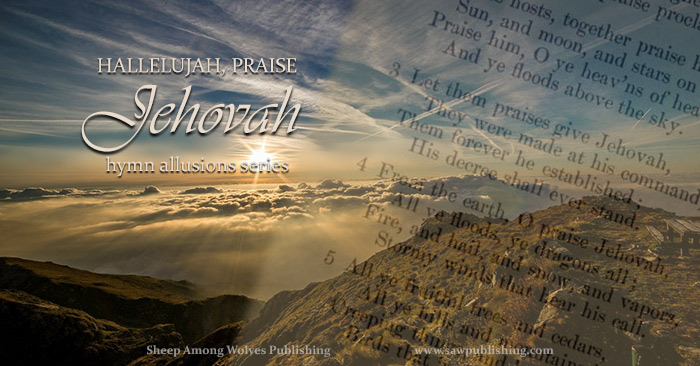
Have you ever noticed how many times we are called upon to praise the Lord in the Bible? In the Psalms alone, the words “praise(d)/praises,” “bless(ed)” or “magnify(ied)” appear more than 230 times in reference to God.
“Let every thing that hath breath praise the LORD. Praise ye the LORD.” – Psalm 150:6
One great way of praising God is the singing of meterized Psalms which speak about the glory and majesty of God, and all the reasons why we should praise Him.
Today’s hymn, “Hallelujah, Praise Jehovah,” is a paraphrase of Psalm 148, that talks about every living creature praising the LORD.
To view the hymn in its entirety, click here.
Hymn Details
Name: Hallelujah, Praise Jehovah
Author: William J. Kirkpatrick, adapted from The Book of Psalms, 1831
Paraphrased Passage: Psalm 148
Highlights: Much more prolific and well-known as a tune-writer, William Kirkpatrick composed a large quantity of tunes in his day, publishing around fifty books of hymns, many of them in collaboration with other compilers. Some of his more famous tunes include those belonging to “He Hideth My Soul,” “O, to Be Like Thee,” “My Faith Has Found a Resting Place,” “Will Your Anchor Hold” and “‘Tis So Sweet.” In the case of “Hallelujah, Praise Jehovah,” Kirkpatrick adapted both words and music from a previous meterized version.
Faithfulness to the Text
In this hymn, the author has obviously been careful to preserve the words of the original as much as possible. Nearly all of the entities called upon to praise the Lord in this Psalm—more than thirty in number—are rendered in the hymn using exactly the same phraseology. This aspect is truly impressive. Take a look at the following list of word and phrase transfers from the Psalm to the hymn. Notice the striking faithfulness which has been preserved.
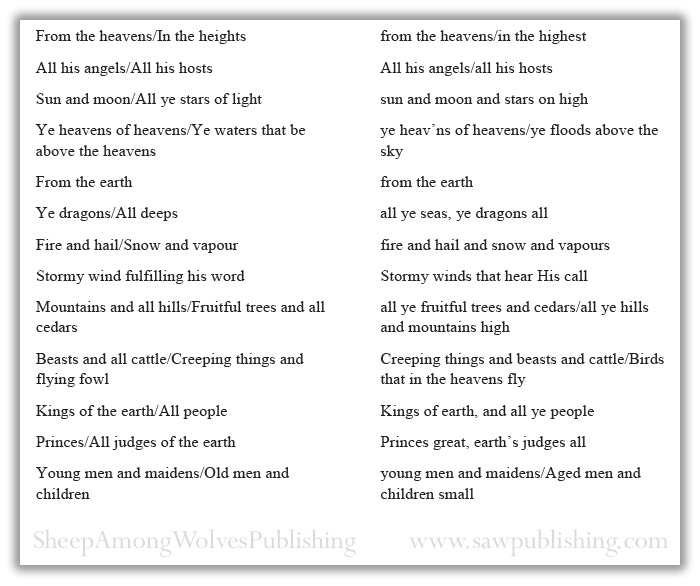
For a full phrase-by-phrase comparison of Psalm 148 and “Hallelujah, Praise Jehovah,” download our complimentary PDF here.
There are only two cases where the author deviates from strict faithfulness, and these come in the final two verses of the Psalm (verses 13 and 14), which say,
“Let them praise the name of the LORD: for his name alone is excellent; his glory is above the earth and heaven.
“He also exalteth the horn of his people, the praise of all his saints; even of the children of Israel, a people near unto him. Praise ye the LORD.”
The entire omission of verse fourteen is the more noticeable of the two, and probably stems from a combination of metrical restraints and the specific nature of its reference to “Israel, a people near unto him [God].” In this sense the hymn is not a “complete” paraphrase.
The other alteration is the use of verse thirteen as a refrain which comes after each of the three hymn verses, as opposed to coming once as the second-last verse of the Psalm. This has the effect of highlighting God’s greatness and majesty and makes quite an apt refrain for the theme of the Psalm.
These two departures from the precise content and order of the Psalm may serve to remind us that no paraphrase, however faithful, is to be taken as the actual inspired words of God, but only as a man-written hymn based upon God’s truth.
Metre and Rhyming Devices
The author has used a fairly standard metre in this Psalm paraphrase (8.7.8.7.D with refrain), with alternating rhymed lines (two and four, six and eight). The emphasis of the poem is alternating stressed and unstressed syllables beginning on the first syllable of each line. This pattern is more customary with 8.7.8.7. than with Common Metre (8.6.8.6.), where the first stressed syllable usually falls on the second beat of each line.
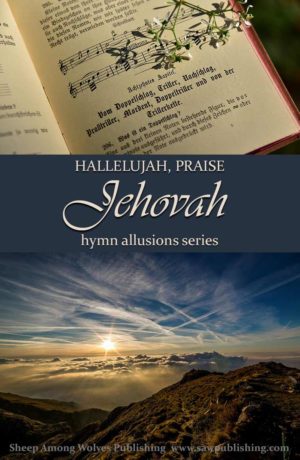 Although this metre is not traditionally considered a long metre, if used to advantage, the pattern of emphasis and the alternate unrhymed lines can produce almost the same results as one fifteen-syllable line might. That is to say, the poet has more freedom to follow the language and flow of the Psalm, instead of being hampered by complex metre or rhyme.
Although this metre is not traditionally considered a long metre, if used to advantage, the pattern of emphasis and the alternate unrhymed lines can produce almost the same results as one fifteen-syllable line might. That is to say, the poet has more freedom to follow the language and flow of the Psalm, instead of being hampered by complex metre or rhyme.
The rhyme in this paraphrase is impeccable, if simple, achieving a balance of good poetry without undo complexity which is so refreshing to find in metrical Psalmody. There is nothing strikingly brilliant about the rhyming pairs, but they are all true rhyme, and leave the mind free to contemplate the sense of the poem.
Flow, Style and Language
It is interesting to observe the difference of flow from Psalm to Psalm and what this means for meterized versions. The last Psalm paraphrase we highlighted was “Unto the Hills Around” (Psalm 121), which required a much more flowing metre and style to preserve the original flavour.
The flow of this Psalm, however, is much less dependant on long, smooth lines, as it lists one by one different creatures, people, or objects which are called upon to praise their Creator. For this reason, the shorter lines employed in this paraphrase fit quite nicely with the short names of each of these entities, especially since only half of the lines are required to rhyme. Because of the simpler pattern, and less complex ideas, it doesn’t suffer from the shorter metre that would have given Psalm 121 a choppy, stilted feeling.
“Hallelujah, Praise Jehovah”
The jubilant music, and joyful words of this Psalm paraphrase, make it an excellent hymn to sing aloud, at work, at school, at play, so that every moment of our lives becomes one great hymn of praise to our Creator and Redeemer.
I love the way the tune rises in the chorus at the words “And His glory is exalted,” with an added crescendo at every repetition of the words, until there is almost a physical sense of that glory being “Far above the earth and sky.”
“Kings of the earth, and all people; princes, and all judges of the earth:
“Both young men, and maidens; old men, and children:
“Let them praise the name of the LORD: for his name alone is excellent; his glory is above the earth and heaven.” – Psalm 148:11-13
You might also enjoy:

